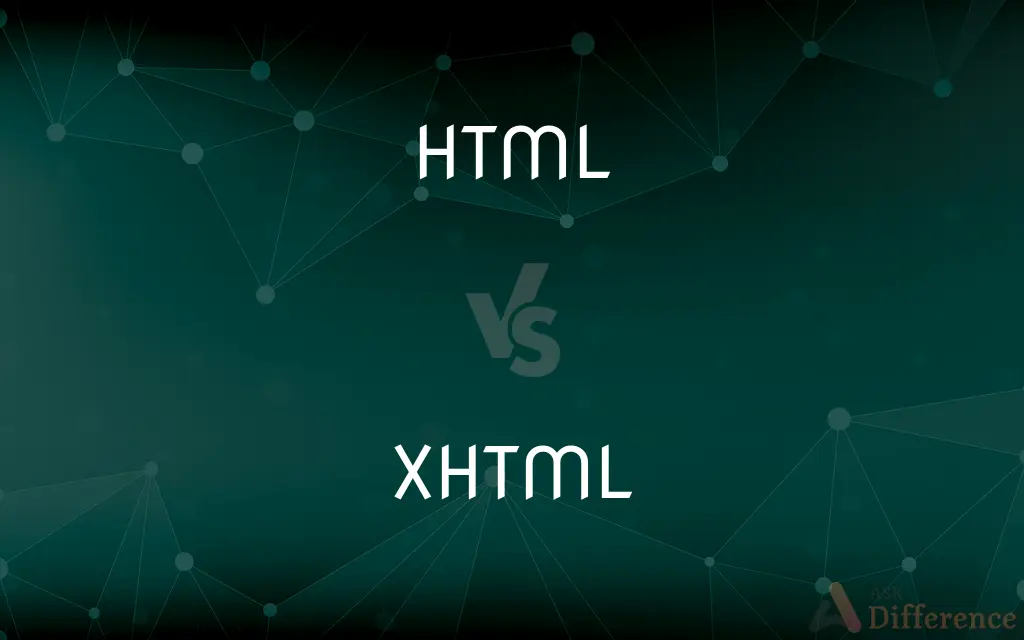HTML vs. XHTML — What's the Difference?
By Tayyaba Rehman — Published on January 23, 2024
HTML is a markup language for creating web pages, focusing on flexibility, while XHTML is a stricter and cleaner reformulation of HTML in XML, emphasizing standard compliance.

Difference Between HTML and XHTML
Table of Contents
ADVERTISEMENT
Key Differences
HTML (Hypertext Markup Language) is the standard language used to create and design web pages. XHTML (Extensible Hypertext Markup Language), is a stricter variant of HTML, reformulated in XML (Extensible Markup Language). XHTML combines the flexibility of HTML with the strict syntax of XML.
HTML allows for a more lenient coding style, where small errors might not affect the page display. XHTML, however, requires strict adherence to XML standards, meaning all elements must be properly nested, closed, and cased correctly.
In HTML, some elements can be left open or not nested correctly, and the page will still render in most browsers. XHTML demands that all tags be closed, attributes be quoted, and elements correctly nested, ensuring more consistent behavior across different browsers.
HTML is widely used and is the foundation of web design, offering more flexibility in coding. XHTML is used in applications where a strict document structure is necessary, and it's often preferred for web applications that require XML compliance.
XHTML pages are served with an XML MIME type which requires that the pages be well-formed, meaning they follow specific rules of structure and encoding. HTML pages are more forgiving of errors and are served with a text/html MIME type.
ADVERTISEMENT
Comparison Chart
Syntax Strictness
Lenient, forgiving of errors
Strict, requires well-formed code
Tag and Element Rules
Tags can be unclosed, elements not nested
Tags must be closed, elements properly nested
Error Handling
Displays despite minor errors
Requires correct formatting to display
MIME Type
Served as text/html
Served as application/xhtml+xml
Usage
Widespread in web pages
Used where XML compliance is needed
Compare with Definitions
HTML
HTML allows flexibility in tag and element use.
In HTML, forgetting to close a tag often doesn't break the page.
XHTML
XHTML is served as application/xhtml+xml.
The server delivers my XHTML pages with an application/xhtml+xml MIME type.
HTML
HTML is a markup language for creating web content.
I used HTML to build my first website.
XHTML
XHTML is a strict reformulation of HTML in XML.
I switched to XHTML for its strict coding standards.
HTML
HTML is the foundation of most web pages.
Every webpage you see is built on HTML.
XHTML
XHTML requires all elements to be properly nested and closed.
In XHTML, every tag and element needs to be correctly structured.
HTML
HTML is served with a text/html MIME type.
Web browsers interpret HTML content as text/html.
XHTML
XHTML won’t display if not well-formed.
My XHTML page wouldn’t render due to a syntax error.
HTML
HTML can display content even with minor errors.
My HTML page displayed correctly, even with some coding mistakes.
XHTML
XHTML is used for XML-compliant web applications.
Our web application requires XHTML for XML compatibility.
HTML
A markup language used to structure text and multimedia documents and to set up hypertext links between documents, used extensively on the World Wide Web.
HTML
A set of tags and rules (conforming to SGML) for using them in developing hypertext documents
Common Curiosities
Is XHTML more secure than HTML?
XHTML’s strict syntax can lead to better security practices, but it doesn’t inherently make a website more secure.
Can HTML and XHTML be used together?
Technically yes, but mixing them can lead to rendering issues due to XHTML's stricter rules.
Is XHTML still widely used?
XHTML usage has declined with HTML5 adoption, but it's still used in specific applications requiring XML compliance.
Does XHTML offer any performance advantages over HTML?
XHTML doesn’t offer significant performance advantages; performance is more influenced by how the code is written and optimized.
Do browsers treat HTML and XHTML differently?
Yes, browsers process XHTML as strict XML, which can affect how errors and document structure are handled.
Why is HTML more popular than XHTML?
HTML's flexibility and leniency in syntax make it more accessible and easier to use for most web developers.
Can XHTML handle multimedia content like HTML?
Yes, XHTML can handle multimedia content, but it must adhere to strict XHTML syntax.
Is it harder to learn XHTML than HTML?
XHTML can be more challenging due to its strict syntax, but the basic principles are similar to HTML.
Are HTML and XHTML documents structured differently?
Their structure is similar, but XHTML is stricter, requiring proper closure and nesting of tags.
Is XHTML compatible with all web browsers?
XHTML is compatible with most browsers, but it must be correctly formatted to render properly.
Can I convert an HTML document to XHTML?
Yes, an HTML document can be converted to XHTML, but it requires ensuring that the document adheres to XHTML’s strict syntax.
Should beginners start with HTML or XHTML?
Beginners often start with HTML due to its more forgiving nature and widespread use.
Are there different versions of XHTML?
Yes, there are different versions, such as XHTML 1.0 and XHTML 1.1, with varying levels of strictness and features.
Will XHTML work with future web technologies?
XHTML should remain compatible with future web technologies, but its usage may continue to decline in favor of HTML5.
How does XHTML affect SEO compared to HTML?
Both XHTML and HTML can be optimized for SEO, and one doesn't have a significant advantage over the other in this regard.
Share Your Discovery

Previous Comparison
Cupcakes vs. Pastries
Next Comparison
AMOLED vs. TFTAuthor Spotlight
Written by
Tayyaba RehmanTayyaba Rehman is a distinguished writer, currently serving as a primary contributor to askdifference.com. As a researcher in semantics and etymology, Tayyaba's passion for the complexity of languages and their distinctions has found a perfect home on the platform. Tayyaba delves into the intricacies of language, distinguishing between commonly confused words and phrases, thereby providing clarity for readers worldwide.













































